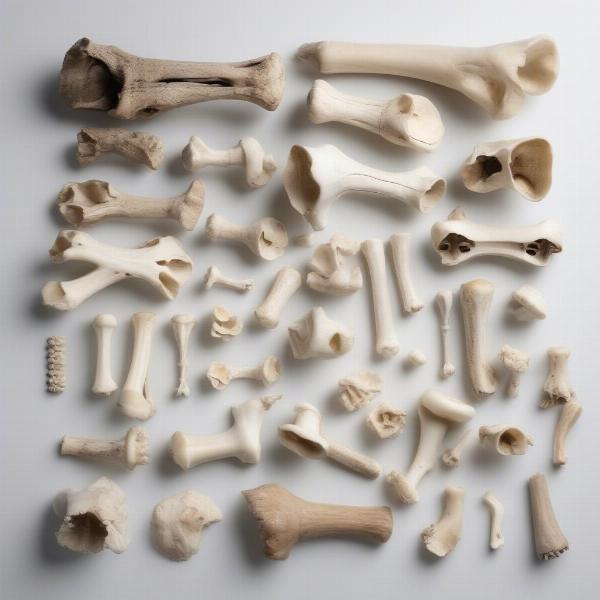Bison bones for dogs are gaining popularity as a natural chew treat, offering a unique alternative to traditional beef bones. But are they truly safe and beneficial for your canine companion? This article delves into the world of bison bones for dogs, covering everything from nutritional benefits and potential risks to proper selection and preparation. We’ll equip you with the knowledge you need to make informed decisions about incorporating this treat into your dog’s diet.
Understanding the Appeal of Bison Bones for Dogs
Bison bones are attractive to dog owners for several reasons. They are often perceived as a more novel and natural option compared to beef or pork bones. Bison are generally raised with fewer antibiotics and hormones than cattle, appealing to owners seeking natural products. Additionally, bison bones are a good source of essential minerals like calcium and phosphorus. They can also provide mental stimulation and help satisfy a dog’s natural chewing instinct.
Nutritional Benefits of Bison Bones for Dogs
Bison bones offer several nutritional benefits. They are a rich source of:
- Calcium and Phosphorus: Essential for strong bones and teeth.
- Minerals: Trace minerals such as magnesium, potassium, and zinc.
- Bone Marrow: A nutritious and flavorful source of healthy fats and vitamins.
These nutrients contribute to overall health and can support joint health, coat condition, and immune function. However, it’s important to remember that bison bones should be given as a treat, not a meal replacement.
Potential Risks of Bison Bones for Dogs
While bison bones can offer benefits, there are potential risks to consider:
- Dental Fractures: Hard bones can cause chipped or broken teeth, especially in aggressive chewers.
- Gastrointestinal Blockage: Splintered bone fragments can cause blockages in the esophagus, stomach, or intestines.
- Constipation: Bone fragments can compact in the digestive tract, leading to constipation.
 Bison bones for dogs various sizes
Bison bones for dogs various sizes
Choosing the Right Bison Bones for Your Dog
Selecting the appropriate type of bison bone is crucial for minimizing risks:
- Size: Choose a bone size appropriate for your dog’s breed and chewing habits. Avoid bones that are too small, as they can be swallowed whole.
- Type: Recreational bones, such as femurs and knuckle bones, are generally safer than weight-bearing bones, which are denser and more likely to splinter.
- Preparation: Raw bones are generally considered safer than cooked bones, which are more brittle and prone to splintering. frozen dog bones can be a good option.
Safe Handling and Supervision
Supervision is key when giving your dog any type of bone. Never leave your dog unattended with a bison bone. Remove the bone once it becomes small enough to be swallowed.
Alternatives to Bison Bones
If you’re concerned about the risks of bison bones, several safer alternatives can provide similar benefits:
- Bully sticks: These are dried beef pizzles, highly digestible and long-lasting.
- Rawhide chews: Made from dried animal hides, offering a satisfying chew. Consider red dog bison products.
- Dental chews: Designed to promote dental health and clean teeth.
Expert Insights
Dr. Emily Carter, a veterinary nutritionist, advises, “Bison bones can be a valuable addition to a dog’s diet, offering nutritional benefits and mental stimulation. However, responsible selection, preparation, and supervision are essential for ensuring your dog’s safety.”
John Smith, a professional dog trainer, adds, “Chewing is a natural instinct for dogs. Bison bones can help satisfy this instinct and provide a healthy outlet for their energy, but it’s crucial to choose the right size and type of bone and always supervise your dog.”
Conclusion
Bison bones can offer a nutritious and enjoyable treat for your dog, but it’s essential to be aware of the potential risks and take necessary precautions. By choosing appropriate bones, supervising your dog, and understanding the benefits and risks, you can help ensure a safe and enjoyable chewing experience. Remember, bison meat for dogs can also be a healthy addition to their diet. Consider also raw bone marrow bones for dogs as a nutritious treat.
FAQ
- Are cooked bison bones safe for dogs? No, cooked bones are more brittle and prone to splintering, posing a risk to your dog’s digestive system.
- Can puppies have bison bones? Yes, but choose small, soft bones specifically designed for puppies.
- How often should I give my dog a bison bone? Bison bones should be given as an occasional treat, not a daily occurrence.
- What should I do if my dog swallows a bone fragment? Contact your veterinarian immediately.
- Can bison bones replace a balanced dog food? No, bison bones are a treat and should not be used as a meal replacement. meat bones for dogs can be a supplemental treat but not a main food source.
- Are all bison bones the same? No, different types of bison bones have different densities and potential risks.
- Where can I buy bison bones for my dog? Check your local pet store or online retailers specializing in natural pet products.
ILM Dog is a leading international website dedicated to providing expert advice and resources on dog care and nutrition. We cover a wide range of topics, from breed selection and health care to training and behavior. Our team of experts is passionate about helping dog owners provide the best possible care for their canine companions. Whether you’re a new dog owner or a seasoned pro, ILM Dog has the information you need to keep your furry friend happy and healthy. For expert advice on dog nutrition, training, and everything in between, contact us at [email protected] or call us at +44 20-3965-8624. Learn more about us at ILM Dog.